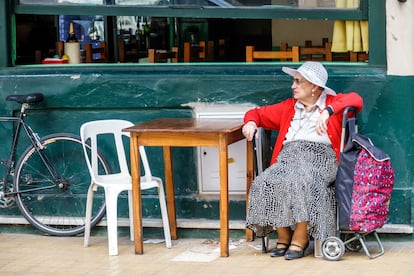Argentine pensioners, in the frontlines of Javier Milei’s attacks on the welfare state
Argentina’s government has changed the adjustment formula by decree, linking pensions to inflation, but the opposition opposes it and demands a debate in Congress


In most countries around the world, pensions are upgraded once a year based on inflation, wages or a combination of both. In Argentina, where prices are skyrocketing at a rate of 272% per year, it is impossible to do so because pensioners’ incomes would become derisory. Inflation is so high that even the quarterly adjustment in force since 2021, based on a formula that measures salaries and tax collection, falls well short of what is required. Javier Milei’s government changed this formula by decree on Monday: as from July, pensions will be increased month by month according to inflation and until then, in April and June, compensatory payments will be made. This measure has angered the opposition, which maintains that it is insufficient to recover pensioners’ purchasing power and demands that the new formula be approved in Congress.
In January and February, the Argentine government managed to close the national accounts in a positive position for the first time since 2012. “I have attached myself to the zero-deficit policy like Ulysses to the mast,” Milei said on Tuesday at a business forum in Buenos Aires. However, the financial surplus was only possible after implementing the largest public spending slash in three decades. 38% of the cut went to pensions, which makes retirees the top priority of Milei’s adjustment at the beginning of his term in office. In the last three months, prices have shot up by an average of 70% and medicines by 77%; pensions, meanwhile, have only increased by 27%, except for the minimum pension, to which a supplementary amount has been added to prevent it from dropping below the poverty line.
The government stresses that the 27% increase is in response to the quarterly formula established during the presidency of Alberto Fernández, which was based on data from September to November 2023. However, Milei’s administration had the opportunity to change it by decree from its first day or to convene Congress to debate the formula initially proposed, which indexed according to inflation from April. By waiting until July, this complicates the recovery of the purchasing power lost in recent months and increases the purchasing power of retirees carried over from previous administrations.
Since 2008, each new government has changed the formula for adjusting pensions. Pensioners have lost with every one of them: under the presidency of Mauricio Macri, the minimum pension in real terms was slashed by 20% and under Fernández, by 2% more, but with the latter, medium and high pensions dropped by more than 25%, according to data published by Chequeado.
The numerous changes have sparked a flurry of lawsuits against the state. “I believe that Argentina is the only country in the world — or one of the very few — that has a court of justice dedicated to Social Security. It is dedicated to hearing the hundreds of thousands of complaints that it receives for non-compliance with the commitment to mobility,” points out Rafael Rofman, social protection researcher at CIPPEC.
However, the underlying issue is more serious. The chronic inflation experienced by Argentina means that the debate on the pension system has become deadlocked time and again regarding the quest for an adjustment formula instead of dealing with a comprehensive reform that would make it more efficient and sustainable. As is the case in the rest of the world, Argentina’s population is also an aging one, and today 16% of its people are over 65 years of age. Yet, unlike in other countries, the discussion on a change in the retirement age remains absent from the public debate at present.
Over 200 exceptions
Experts applaud the extensive coverage of the Argentine pension system, close to 95% of the total, one of the broadest in the region. Nonetheless, they believe that there is a significant margin for making it more efficient. One of the obstacles is the considerable fragmentation of the public pay-as-you-go system, comprising numerous special schemes and more than 200 exceptions to the general system. Its beneficiaries can retire before the age of 60 for women and 65 for men and/or they receive higher pensions. “The array of exceptions in the pension system leads to significant inequity, with very high benefits for some and very low benefits for others,” says Rofman.
The best-known example is the privileged pensions granted to former presidents, equivalent to around 30 minimum pensions, however, among the beneficiaries of the special regimes there are judges, diplomats, provincial employees, teachers, police and military, among many others. Rofman believes that with the current system “a lot is spent to obtain protection that could be obtained with nearly three points less of GDP.”
An even greater problem is the high level of informality in the labor market, which is close to 40%. The lack of social security contributions by these workers (and by their employers) means that the pension system is less sustainable, on the one hand, and makes it increasingly difficult for them to receive an adequate income when they reach retirement age. Approximately four million of Argentina’s 10.5 million retirees receive a minimum pension to which they were entitled without having paid taxes for the 30 years stipulated by the general system.
Milei wants to exclude from the pension system those who receive a pension without having contributed for the minimum period specified by law, believing it to be “an injustice” towards those who have contributed accordingly. One of the options under consideration is for them to receive state aid similar to that received by the most disadvantaged families. In the long term, the president is aiming for a comprehensive reform that would reduce the role of the state and “introduce private savings mechanisms.” Argentina has previously used such mechanisms and reversed them, but everything suggests that Milei will do his utmost to force this debate once again.
Sign up for our weekly newsletter to get more English-language news coverage from EL PAÍS USA Edition
Tu suscripción se está usando en otro dispositivo
¿Quieres añadir otro usuario a tu suscripción?
Si continúas leyendo en este dispositivo, no se podrá leer en el otro.
FlechaTu suscripción se está usando en otro dispositivo y solo puedes acceder a EL PAÍS desde un dispositivo a la vez.
Si quieres compartir tu cuenta, cambia tu suscripción a la modalidad Premium, así podrás añadir otro usuario. Cada uno accederá con su propia cuenta de email, lo que os permitirá personalizar vuestra experiencia en EL PAÍS.
¿Tienes una suscripción de empresa? Accede aquí para contratar más cuentas.
En el caso de no saber quién está usando tu cuenta, te recomendamos cambiar tu contraseña aquí.
Si decides continuar compartiendo tu cuenta, este mensaje se mostrará en tu dispositivo y en el de la otra persona que está usando tu cuenta de forma indefinida, afectando a tu experiencia de lectura. Puedes consultar aquí los términos y condiciones de la suscripción digital.








































